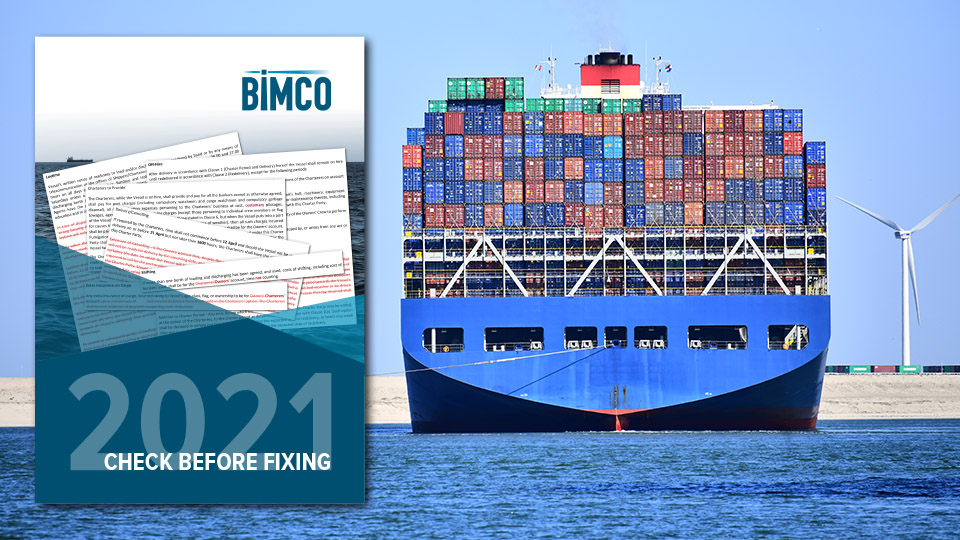Ship-to-Ship Transfer Clause for Dry Bulk Voyage Charter Parties 2015
Ship-to-Ship Transfer Clause for Dry Bulk Voyage Charter Parties 2015
BIMCO Ship-to-Ship Transfer Clause for Dry Bulk Voyage Charter Parties 2015
(a) The Charterers shall have the right to order the Vessel to conduct ship to ship cargo operations to or from any other vessel(s), including floating cranes and barges, hereinafter “Ship-to-Ship Operations”. All such Ship-to-Ship Operations shall be at the Charterers’ risk, cost and expense.
(b) The Charterers shall direct the Vessel to a safe place, anchorage or berth for the conduct of such Ship-to Ship Operations where the Vessel can safely proceed to, lie and depart from, but always subject to the Master’s approval. The Charterers shall provide adequate fendering, securing and mooring equipment, and/or other equipment, as necessary for these operations, to the satisfaction of the Master.
(c) The Charterers shall obtain any and all relevant permissions from proper authorities to perform Ship-to-Ship Operations.
(d) If Ship-to-Ship Operations are carried out at a place or anchorage, such place or anchorage shall be considered as a berth. Notice of readiness may be tendered at such place or anchorage and laytime shall count in accordance with the Charter Party.
If, at any time, the Master considers that Ship-to-Ship Operations are, or may become, unsafe, he may order them to be suspended or discontinued. In such event the Master shall have the right to order the other vessel(s) away from the Vessel or to remove the Vessel.
Any stoppages or additional time attributable to Ship-to-Ship Operations shall not be excluded from laytime or time on demurrage.
(e) The Charterers shall indemnify the Owners for any liabilities, losses or costs, arising out of or related to Ship-to-Ship Operations.
Explanatory notes
This is a new clause for voyage charter parties setting out a regime for ship-to-ship cargo transfers in dry bulk trades. The clause complements the previously issued Ship-to-Ship Transfer Clause for Time Charter Parties, but there is an important distinction between the two provisions. The time charter version was drafted for use in tanker and dry bulk trades. However, because ship-to-ship transfers are normally incorporated as a standard provision in tanker voyage charter parties, the voyage charter party version has been developed for use only in connection with dry bulk cargo trades.
Attention is drawn to the following important points:
It is a rider provision intended for use in response to charterers’ request to undertake ship-to-ship operations that were not otherwise contemplated in the underlying charter party or are required after fixing. It is important to note that use of the clause will result in a “safe berth” or dock charter being broadened to give charterers additional rights (which might need to be reviewed against other provisions in the charter party) to undertake cargo operations at anchorage; and
The substantive content addresses issues arising from the resulting changed nature of cargo operations, sets out charterers’ obligations for ensuring a safe location and provision of all necessary equipment for conducting such operations, modifies laytime counting so that owners’ interests are not compromised by the enhanced risks of delay due to working other than at berth and requires charterers to indemnify owners for any liabilities connected with ship-to-ship operations.
BIMCO is grateful to the following members for their work in developing the clause:
- Jean-Pierre Laffaye, Cetragpa, (Chairman) (Owner)
- Leonidas Los, Tri-Marine Shipping Co. (Owner)
- Georg Scheel, Nordisk (Club)
- Barry Ayliffe, North of England P&I Club (Club)
- Jonathan Young, Cargill Ocean Transportation (Charterer)
Background notes
Sub-clause (a) - The provision is triggered at charterers’ option and at their risk, cost and expense. The defined term “Ship-to-Ship Operations” covers all cargo activities to or from any other vessel and includes floating cranes and barges;
Sub-clause (b) - Subject to Master’s approval, charterers are responsible for directing the vessel to a safe place, anchorage or berth and for the provision of all securing, mooring and other equipment required;
Sub-clause (c) - Charterers are responsible for obtaining the necessary permission required to undertake ship-to-ship operations;
Sub-clause (d)
First sub-paragraph: addresses time counting if operations are undertaken at a place or anchorage. Such place is regarded as “a berth” for the purposes of giving notice of readiness and the commencement of laytime as per the charter party;
Second sub-paragraph: sets out the Master’s rights, on safety grounds, to suspend or discontinue operations, remove the vessel or order the other vessel away;
Third sub-paragraph: addresses the additional risks of delay likely to arise while working at anchorage. Stoppages or additional time attributable to Ship-to-Ship Operations (and non-exhaustive examples are likely to include sea or wave conditions, limitations imposed by regulatory authorities, charterers’ restrictions, owners’ safety requirements or interruptions due to bad weather, such as fog, that would not have prevented cargo operations at a berth) are not deducted from laytime or time on demurrage. Laytime, or time on demurrage, therefore runs without interruption other than for charter party excepted periods such as SHEX.
Sub-clause (e) - Agreement to permit ship-to-ship operations involves additional risks that would not otherwise arise and the indemnity provision therefore reflects the
extent of charterers’ liability in sub-clause (a) for all “risk, cost and expense”.
Originally published in BIMCO Special Circular No. 1, 9 January 2015 - Ship-to-Ship Transfer Clause for Voyage Charter Parties.
Related Help & Advice
Create or edit a contract
The one-stop digital shop for all the standard maritime contracts and clauses you’ll ever need.
Latest Related News
-
BIMCO adopts portfolio of four ETS clauses
The shipping industry is facing an increase in new regulations from the International Maritime Organization (IMO) and the European Union (EU) and an increase in the urgency to decarbonise. To support the industry, BIMCO has developed a portfolio of new emission trading scheme (ETS) clauses.
-
BIMCO adopts new CII clause for Voyage Charter Parties
The shipping industry is facing an increase in new regulations from the International Maritime Organization (IMO) and the European Union (EU) and an increase in the urgency to decarbonise. To support the industry, BIMCO has developed a new CII Clause for Voyage Charter Parties. The clause was adopted by BIMCO’s Documentary Committee on 11 October and is the latest addition to BIMCO’s portfolio of carbon clauses.
-
BIMCO’s CII clause adopted
The BIMCO Documentary Committee has adopted a CII Operations Clause for Time Charter Parties which will help the industry commercially navigate the complexities of the new CII regulations from the International Maritime Organization (IMO).
-
Fumigation
BIMCO providing information and guidance relating to fumigation of cargoes that are shipped under the IMSBC Code, the Grain Code and the IMDG Code.
-
BIMCO publishes EEXI Transition Clause ahead of IMO efficiency regulation
New regulation from the International Maritime Organization (IMO), which will require existing ships to reduce carbon emissions, is due to enter into force in just under one year. As compliance will benefit to a large extent from co-operation between shipowners and charterers, BIMCO has developed a new clause to address the changes.
ELSEWHERE ON BIMCO
Holiday calendar
BIMCO's Holiday Calendar covers general holidays in over 150 countries, plus local holidays and working hours in more than 680 ports around the world.
Learn about your cargo
For general guidance and information on cargo-related queries.




